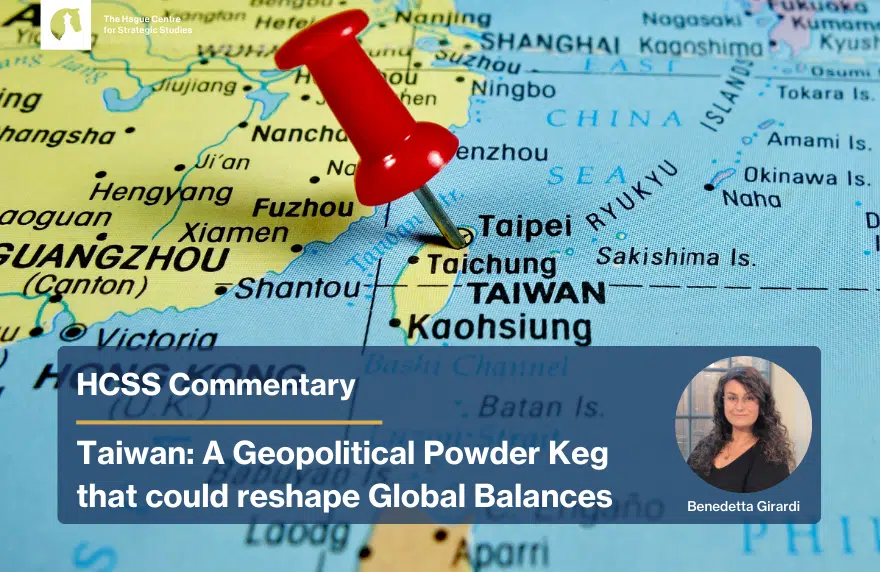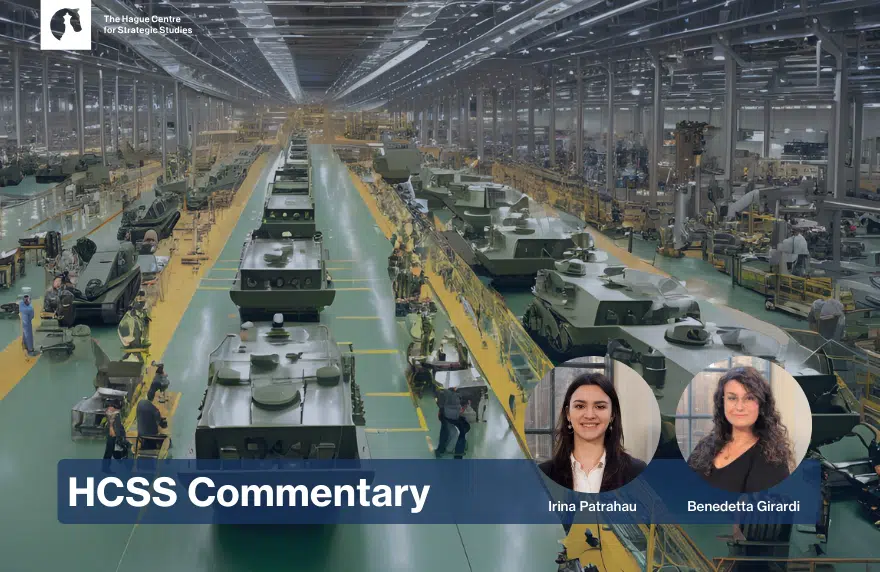Given Taiwan’s strategic significance—both in military and economic terms—it is imperative to examine the potential scenarios and broader implications of a Chinese attempt to force reunification, writes HCSS strategic analyst Benedetta Girardi in an op-ed originally written in Italian for and published in Analisi Difesa.
The Taiwan crisis stands as one of the most intricate and consequential geopolitical flashpoints of the 21st century. Far from being a mere regional dispute, Taiwan’s status is a defining element in the strategic competition between the United States and China, influencing military alliances, economic stability, and the broader international order.
“The reunification of the motherland is a historical inevitability,” declared President Xi Jinping in his New Year’s address of 2024, reinforcing a narrative he has consistently espoused. This rhetoric underscores Beijing’s determination to bring Taiwan under its control, a stance that has intensified tensions across the Taiwan Strait. Under Xi’s leadership, China’s territorial claims have grown increasingly assertive, elevating the risk of a military confrontation with far-reaching global consequences.
Given Taiwan’s strategic significance—both in military and economic terms—it is imperative to examine the potential scenarios and broader implications of a Chinese attempt to force reunification.
The military equation: preparing for the unthinkable
The military dimension of a potential conflict over Taiwan is shaped by the island’s strategic importance, China’s military advancements, and the evolving posture of the U.S. and its allies.
Taiwan occupies a pivotal position in global and Indo-Pacific security due to its strategic location within the first island chain, anchoring a network of U.S. allies from Japan to the Philippines. Its military significance is undeniable, as its control—or lack thereof—shapes the regional balance of power. If Taiwan remains outside of China’s grasp, Beijing’s military capabilities remain constrained, limiting its ability to project power beyond its shores.
Conversely, if China were to annex Taiwan, it could deploy submarines, air defence units, and surveillance systems that would significantly restrict U.S. military operations and erode Washington’s ability to defend its Asian allies. This shift would not only embolden Beijing’s bid for regional dominance but also cast doubt on U.S. security commitments, potentially prompting allies to develop independent military capabilities, including nuclear weapons. Furthermore, Taiwan serves as a crucial defensive buffer, preventing China from extending its naval and aerospace power deep into the Pacific, which would threaten U.S. influence and destabilize the region. The future of Taiwan is thus inextricably linked to the broader security architecture of the Indo-Pacific, making its fate a decisive factor in global stability.
China significant modernization of its military adds fuel to the fire. With the rapid expansion of its navy, missile forces, and cyber capabilities, the PRC has strengthen its preparedness for amphibious and joint operations. Furthermore, the People’s Liberation Army (PLA) has repeatedly demonstrated its preparedness through large-scale exercises and routine incursions into Taiwan’s Air Defence Identification Zone (ADIZ), signalling its readiness to escalate tensions if necessary.
China can deploy several tactics to enforce reunification, from economic coercion and grey zone strategies to naval and aerial blockades. In the worst case scenario, Beijing could attempt an amphibious invasion, though Taiwan’s rugged terrain and escalatory risks make such an operation much more dangerous. Still, the People’s Liberation Army Navy (PLAN) seem to be preparing for the eventuality by strengthening its ability to conduct large-scale amphibious landings with the launch of multiple Type-075 assault ships.
Meanwhile, Taiwan has focused on asymmetric warfare, adopting a “porcupine strategy” designed to make an invasion costly through mobile missile systems, drones, and an increasingly resilient civilian defence infrastructure. The expansion of Taiwan’s military conscription further underscores the island’s commitment to defending itself in a prolonged conflict.
While the adoption of a stronger denial strategy enhances the possibility of survival for Taiwan, the intervention of third parties will be vital for the island, should China impose a semi-permanent blockade or launch an invasion. Above all, US support will be decisive. Historically, the U.S. has maintained a policy of “strategic ambiguity,” leaving uncertain whether it would intervene militarily if China attempted to seize Taiwan.
At the same time, recent arms sales, including of F-16 fighter jets, anti-ship missiles, and drone systems, and military cooperation suggest a shift toward a more explicit commitment to Taiwan’s defence and upholding the status quo. In fact, the U.S. has responded to China’s military buildup by strengthening its alliances in the Indo-Pacific. The Quadrilateral Security Dialogue (Quad), comprising the U.S., Japan, India, and Australia, has gained renewed focus, while NATO has also expressed concern over China’s actions in the Taiwan Strait.
However, a full-scale military confrontation would be catastrophic. Given China’s growing missile capabilities, U.S. bases in the region, such as those in Guam and Okinawa, would be vulnerable to attacks. A conflict could quickly escalate into a broader regional war, drawing in Japan, South Korea, and possibly other ASEAN nations.
The complexity of a military confrontation over Taiwan brings along significant risks of miscalculation that might lead to a rapid escalation of tensions that would have consequences reaching far beyond the military domain.
Economic fallout: the cost of conflict
A military confrontation over Taiwan would have devastating consequences for the global economy.
Taiwan holds significant importance on the international economic stage, both as a strategic hub for maritime trade and as the leader in semiconductor manufacturing. Situated along some of the world’s busiest trade routes, the Taiwan Strait is a critical passage for global commerce, with 44% of the global container fleet passing through it in 2022. The strait also serves as a key corridor for China’s trade with Europe and links two of China’s most important manufacturing zones, the Yangtze River Delta and Pearl River Delta. Disruptions in this region would have severe consequences for global supply chains and economic stability.
Beyond trade, Taiwan dominates the semiconductor industry through its indigenous giant, Taiwan Semiconductor Manufacturing Company (TSMC), which controls over 90% of the world’s advanced chip production. These semiconductors are vital for cutting-edge technologies, including AI and defence systems, making Taiwan an essential player in the ongoing technological competition between the U.S. and China. A Chinese takeover—whether through peaceful unification or forceful annexation—would shift the balance of global technological power, potentially granting Beijing control over the world’s most advanced semiconductor manufacturing.
A crisis over Taiwan would have devastating economic effects. A Chinese-led semi-permanent blockade could shrink global GDP by 5%, costing the world economy over $2 trillion, with major disruptions to industries like automotive, electronics, and computing. If a war broke out, the economic consequences would be even more severe, with global GDP falling by 10%—twice the impact of the 2008 financial crisis or the COVID-19 pandemic. Trade disruptions through the Taiwan Strait would halt the transit of $2.45 trillion worth of goods, while Taiwan and China’s economies would suffer massive contractions of 40% and 16.7%, respectively.
Ultimately, Taiwan’s economic significance makes it a flashpoint in global supply chains and any disruption to the island’s economy would reverberate across industries, economies, and supply chains worldwide.
Political consequences: redrawing the global order
The Taiwan crisis also carries profound political ramifications, intensifying geopolitical rivalries, reshaping global alliances, and affecting the core principles of the international order.
An exacerbation of tensions over Taiwan would have significant political consequences for both China and the United States. In China, President Xi Jinping has tied national reunification with Taiwan to his vision of Chinese rejuvenation, meaning failure to assert control over the island could weaken his leadership and destabilize the Communist Party’s rule. Conversely, a successful takeover could strengthen his grip on power but at the cost of international isolation.
In the U.S., a war over Taiwan would become a defining issue in domestic politics, with pressure on any administration to take a firm stance against Chinese aggression. American policymakers would face difficult choices balancing military action, economic consequences, and public opinion. A prolonged conflict or failure to defend Taiwan could erode confidence in U.S. global leadership, while a decisive response could further entrench Cold War-style divisions between China and the West.
Internal political instability in the US and China is likely to further exacerbate Sino-American competition, enhancing geopolitical tensions and great power rivalry. For both the US and China, Taiwan has hence not only economic and military relevance, but also political significance.
Beyond bilateral rivalries, a Taiwan crisis would also reshape global alliances and security arrangements. U.S. intervention could draw in regional allies such as Japan, South Korea, and Australia, considerably enlarging the scope of the crisis. At the same time, the uncertain role of other regional actors, such as India, Vietnam, and Indonesia further adds to the unpredictability of the political outcomes of a Taiwan crisis. Meanwhile, European nations would be forced to reassess their China policies. While Europe maintains strong economic ties with Beijing, a Chinese attack on Taiwan could prompt a further reconsideration of Europe’s strategic dependence on China. The European Union, already wary of economic coercion from Beijing, might impose sanctions or limit trade with China, further straining diplomatic relations. Additionally, NATO could expand its focus beyond the Euro-Atlantic, increasing cooperation with Indo-Pacific democracies to counter China’s growing influence.
Finally, a conflict over Taiwan would challenge fundamental principles of the international order, particularly the norm that borders cannot be changed by force. If China were to absorb Taiwan despite resistance, it would reinforce a precedent set by Russia’s invasion of Ukraine, normalizing authoritarian aggression against democratic neighbours. This would undermine global stability, erode confidence in international institutions, and encourage other revisionist powers to challenge territorial boundaries. Furthermore, Taiwan’s fall would signal a retreat of democratic governance in Asia, potentially weakening global democratic movements. The international response to such a crisis would determine whether the existing order remains resilient or shifts toward a more unstable, multipolar world defined by power politics.
The defining battle of the 21st century?
The Taiwan crisis stands at the intersection of military strategy, global economics, and political power struggles, making it one of the most consequential geopolitical issues of our time. As China intensifies its claims over the island and expands its military capabilities, the risk of conflict—whether through calculated coercion or full-scale war—continues to grow. Taiwan’s unique position in the Indo-Pacific security framework and its dominance in semiconductor production elevate its significance far beyond a mere territorial dispute, entangling major global players in a high-stakes confrontation with implications that extend across multiple domains.
From a military standpoint, the increasing tensions across the Taiwan Strait highlight the delicate balance of deterrence and defence. While Taiwan has invested in asymmetric strategies to counter a potential invasion, its long-term security ultimately hinges on external support, particularly from the United States and its allies. A failure to deter Chinese aggression could embolden Beijing to assert further regional dominance, challenging the stability of the broader Indo-Pacific and forcing neighbouring countries to reconsider their security strategies. Meanwhile, any military engagement would carry immense risks of escalation, not only for Taiwan and China but for the global order, potentially drawing in major powers and altering the nature of modern warfare.
Beyond military concerns, the economic ramifications of a Taiwan crisis cannot be overstated. The island’s centrality to global trade and semiconductor manufacturing makes it a linchpin of technological innovation and economic stability. A disruption to Taiwan’s economy—whether through a blockade, cyberattacks, or war—would send shockwaves through global markets, destabilizing industries and economies that rely on its high-tech supply chains. The economic interdependence between China and its trading partners further complicates the situation, as sanctions or economic countermeasures in response to aggression could have profound and unpredictable consequences for global trade.
Politically, Taiwan’s fate carries deep implications for international norms and the balance of power. A successful Chinese takeover, whether through force or political pressure, would challenge the principle of national sovereignty and encourage other revisionist states to pursue territorial ambitions. Conversely, a strong international response to deter aggression could reinforce alliances and reshape global security dynamics, potentially solidifying a coalition against Chinese expansionism.
Ultimately, the Taiwan crisis is not just about control over a single island—it is a defining struggle that will shape the trajectory of U.S.-China relations, the Indo-Pacific region, and the future of global stability. How the world responds will determine whether deterrence and diplomacy can prevail or if the international order will face an irreversible shift toward conflict and division.
This article by HCSS strategic analyst Benedetta Girardi was originally written in Italian for and published in Analisi Difesa, on April 2, 2025.






